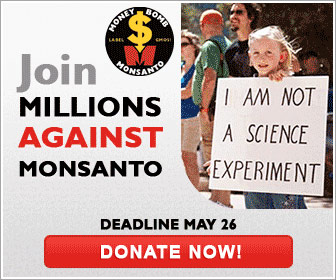Earlier this year, volunteers in California busied themselves gathering 800,000 signatures (500,000 required) for a ballot initiative to require the labeling of foods containing genetically-modified organisms (GMOs). The California Right to Know Genetically Engineered Food Act has been submitted to the State Attorney General and Californians will cast their votes later this year. The first section summarizes GMO concerns (if you don't know much about it, please read):
SECTION 1: FINDINGS AND DECLARATIONS
- California consumers have the right to know whether the foods they purchase were produced using genetic engineering. Genetic engineering of plants and animals often causes unintended consequences. Manipulating genes and inserting them into organisms is an imprecise process. The results are not always predictable or controllable, and they can lead to adverse health or environmental consequences.
- Government scientists have stated that the artificial insertion of DNA into plants, a technique unique to genetic engineering, can cause a variety of significant problems with plant foods. Such genetic engineering can increase the levels of known toxicants in foods and introduce new toxicants and health concerns.
- Mandatory identification of foods produced through genetic engineering can provide a critical method for tracking the potential health effects of eating genetically engineered foods.
- No federal or California law requires that food producers identify whether foods were produced using genetic engineering. At the same time, the U.S. Food and Drug Administration does not require safety studies of such foods. Unless these foods contain a known allergen, the FDA does not even require developers of genetically engineered crops to consult with the agency.
- Polls consistently show that more than 90 percent of the public want to know if their food was produced using genetic engineering.
- Fifty countries—including the European Union member states, Japan and other key U.S. trading partners—have laws mandating disclosure of genetically engineered foods. No international agreements prohibit the mandatory identification of foods produced through genetic engineering.
- Without disclosure, consumers of genetically engineered food can unknowingly violate their own dietary and religious restrictions.
- The cultivation of genetically engineered crops can also cause serious impacts to the environment. For example, most genetically engineered crops are designed to withstand weed-killing pesticides known as herbicides. As a result, hundreds of millions of pounds of additional herbicides have been used on U.S. farms. Because of the massive use of such products, herbicide-resistant weeds have flourished—a problem that has resulted, in turn, in the use of increasingly toxic herbicides. These toxic herbicides damage our agricultural areas, impair our drinking water, and pose health risks to farm workers and consumers. California consumers should have the choice to avoid purchasing foods production of which can lead to such environmental harm.
- Organic farming is a significant and increasingly important part of California agriculture. California has more organic cropland than any other state and has almost one out of every four certified organic operations in the nation. California’s organic agriculture is growing faster than 20 percent a year.
- Organic farmers are prohibited from using genetically engineered seeds. Nonetheless, these farmers’ crops are regularly threatened with accidental contamination from neighboring lands where genetically engineered crops abound. This risk of contamination can erode public confidence in California’s organic products, significantly undermining this industry. Californians should have the choice to avoid purchasing foods whose production could harm the state’s organic farmers and its organic foods industry.
- The labeling, advertising and marketing of genetically engineered foods using terms such as “natural,” “naturally made,” “naturally grown,” or “all natural” is misleading to California consumers.
SECTION 2: STATEMENT OF PURPOSE
The purpose of this measure is to create and enforce the fundamental right of the people of California to be fully informed about whether the food they purchase and eat is genetically engineered and not misbranded as natural so that they can choose for themselves whether to purchase and eat such foods. It shall be liberally construed to fulfill this purpose.
Sounds fair, right? All we want is the labeling so we can make an informed choice as to what we eat. The biotech industry does not want to label GMOs because they assume less people will purchase their products (they're probably right). So now comes the campaign fight. Wealthy companies such as Monsanto will likely outspend their opposers by 100 to 1 to persuade people to vote no. The public really needs to understand the health and environmental dangers of GMOs before voting.
From May 1-26, there is a huge push to raise funds for the cause. The Organic Consumers Association is hoping to raise $1,000,000 toward the campaign. If they can do it, a coalition of public interest groups and organic companies have promised to match with an additional million. As of today, they have raised around $750,000.
Even if you live elsewhere, you can help! If this initiative is passed, its effects will reach beyond California. It will pave the way for other states to enact similar laws, and I imagine that many of the positively-labeled foods will be distributed in other states/countries as well. Perhaps we will eventually see a labeling requirement for the whole United States.
I'm donating today. Will you join me?


What a great cause. There is no question consumers should be able to know whether or not their food contains GMOs.
ReplyDeleteI was wondering the other day if GMO foods can still be labeled certified organic because they were grown without pesticides, etc... the first section of the petition makes me think they can't?
No. If you buy something that is USDA Organic, it cannot contain GMOs. I guess that might become fuzzier as more organic fields are contaminated.
DeleteThanks for posting that. I think it is really relevant to the rest of the country, because California so often leads out on this kind of movement.
ReplyDelete